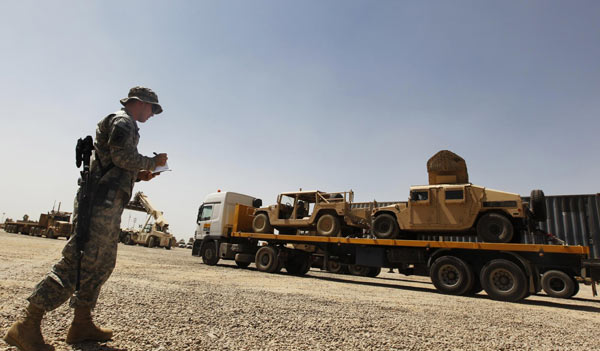Global General
US ends combat in Iraq but instability lingers
(Agencies)
Updated: 2010-08-31 06:28
 |
Large Medium Small |
BAGHDAD - The US military formally ends combat operations in Iraq on Tuesday as President Barack Obama seeks to fulfil a promise to end the war despite persistent instability and attacks that kill dozens at a time.
|
 A US Soldier takes down the vehicle numbers of humvees loaded up on a trailer as they prepare to leave Iraq at Balad Base 80 km (50 miles) north of Baghdad August 27, 2010. [Agencies] |
US troop numbers were cut to 50,000 in advance of the August 31 milestone in the 7-1/2-year-old war launched by Obama's predecessor, George W. Bush, whose stated aim was to destroy Iraqi weapons of mass destruction. No such weapons was found.
| ||||
"The story is not about 50,000. The story is that we are continuing to be committed to Iraq, but our commitment is going to change," the outgoing US military commander in Iraq, General Raymond Odierno, said last week.
"It's no longer one that is focused solely on a military commitment. We are building a different relationship with Iraq, one that's focused on economic development, one that's focused on technological development, one that's focused on political development and cultural development."
Obama promised war-weary US voters he would extricate the United States from the Iraq war. Almost 1 trillion dollars have been spent, and more than 4,400 US soldiers and over 100,000 Iraqi civilians killed since the 2003 invasion.
Obama's Democratic party is battling to retain control of Congress in elections in November. Vice President Joe Biden flew into Baghdad on Monday.
Despite Tuesday's largely symbolic deadline for combat operations to end, the 50,000 US soldiers staying on in Iraq for another 16 months are a formidable and heavily armed force.
Security pact
Iraqi security forces have already been taking the lead since a bilateral security pact came into force in 2009. US soldiers pulled out of Iraqi towns and cities in June last year.
Nevertheless, many Iraqis are apprehensive as US military might is scaled down.
The animosity that led to carnage between majority Shi'ites and minority Sunnis who dominated Iraq under overthrown dictator Saddam Hussein has not healed, and a potentially explosive conflict between Arabs and Kurds has not been resolved.
More than 1.5 million Iraqis are still displaced after being driven from their homes by violence. Many live in squalor.
Iraq's leaders have been unable to form a new government almost six months after an election that many had hoped would chart a path toward stability at a time when deals to develop the country's vast oilfields held the promise of prosperity.
Instead, the ballot could widen ethnic and sectarian rifts if a Sunni-backed cross-sectarian alliance that won the single biggest bloc in the new 325-seat parliament is excluded from power by the major Shi'ite-led political factions.
Suspected Sunni Islamist insurgents linked to al Qaeda have tried to exploit the political vacuum and declining US troop numbers with persistent suicide bombings and assassinations.
The number of civilians killed in July almost doubled from the month before to 396.
The insurgents have targeted domestic security forces in particular, killing 57 at an army recruitment centre on August 17 and more than 60 when suicide car bombers attacked police stations around the country on August 25.



